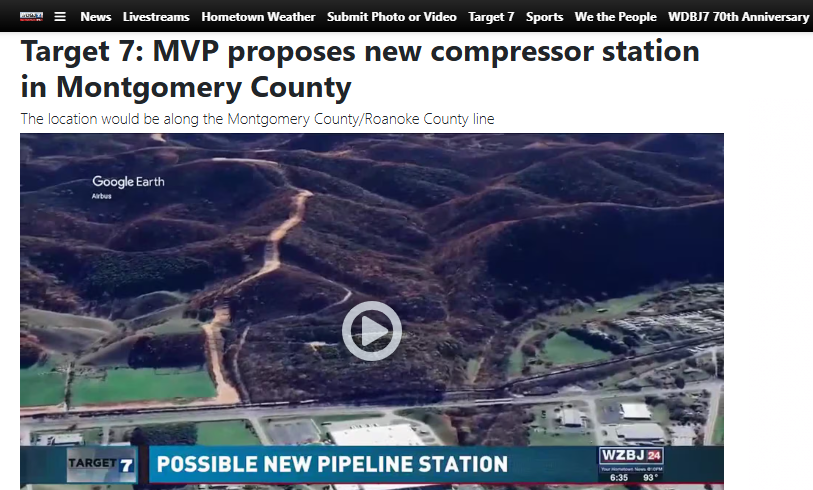
MVP is back for more!
The Mountain Valley Pipeline (MVP), has announced a new project called “MVP Boost”. This prospective project would expand the capacity of the existing MVP mainline.
MVP Boost plans to…
-
The MVP Boost project is designed to expand the capacity of the Mainline system by increasing compression at the three existing compressor stations in West Virginia. This will be accomplished through the following modifications:
Bradshaw Compressor Station: Addition of one Titan 130E gas-driven turbine
Harris Compressor Station: Addition of one Titan 350 gas-driven turbine
Stallworth Compressor Station: upgrades to the two existing compressor and the installation of two additional Titan 130E gas-driven turbines
-
EQT announced that as a part of their expansion project a new compressor station in Montgomery County, VA would be constructed.
MVP has been operational since June 2024 without a compressor station in VA.
The new Swann Compressor Station will include:
Two Titan 350 gas-driven turbines and one Titan 250 gas-driven turbine to increase system compression.
Approximately 0.2 miles of new 42-inch pipeline to connect the station to the existing Mainline System.
A mainline block valve will be installed within the station’s fence line to keep gas flowing through the Mainline System if the station is shut down for maintenance.
A pig launcher and receiver will be installed within the fence line to support pipeline inspection and maintenance.
-
The MVP Boost Project was originally designed to expand the Mainline system’s capacity by 500,000 dekatherms per day (Dth/d). However, in its project application to FERC, MVP stated that the project will now provide up to 600,000 Dth/d of additional capacity - increasing the capacity of the mainline system by 30% of the current rate.
This increase in capacity will be purchased under 20-year agreements by Duke Energy Carolinas, LLC, Public Service Company of North Carolina, Inc., and Virginia Power Services Energy Corp., Inc., all at negotiated rates.
What is a compressor station?
A compressor station is an above-ground facility that pumps methane gas through a pipeline system. They are placed strategically along transmission pipeline systems in order for the gas to reach the next delivery points.
On interstate pipelines like MVP, these stations are regulated by the Federal Energy Regulatory Commission (FERC) while the air emissions from these stations are regulated by the Environmental Protection Agency (EPA) and state permitting authorities.
What do we know so far?
During its July 22, 2025 earnings presentation, EQT announced “an expansion of the Mainline via the addition of a new compressor station in Montgomery County, Virginia”.
In 2021, Mountain Valley Pipeline LLC bought 64.5 acres at 6684 Cove Hollow Road, Elliston, VA and has since confirmed the site to be the proposed Swann compressor station location.
Federal Energy Regulatory Commission
On October 23, 2025, MVP applied for a Certificate of Public Convenience and Necessity with FERC under the docket CP26-14-000. In their application, they request that FERC issue an order authorizing the project by November 19, 2026 with a target in service date for mid-2028.
FERC has established an intervenor deadline of November 26, 2025 and request public comments on the scope of environmental issues by December 19, 2025. For more information on how to comment and intervene on the FERC docket, visit our toolkit.
Virginia Department of Environmental Quality
In addition to their FERC application, MVP has filed an application for a new minor source air permit with the Virginia Department of Environmental Quality with a target permit decision date for July 2026. This application is currently under review, for updates visit the Virginia Permit Transparency’s permit timeline.
In 2021, Virginia’s Air Pollution Control Board denied the air permit for the proposed Lambert Compressor Station, a part of the Mountain Valley Pipeline Southgate Extension in Pittsylvania County, Virginia.
The Board determined the Lambert application improperly endangered communities with environmental burdens and failed to comply with legal precedent and statutory requirements, read more. This decision sets a legal and regulatory precedent for challenging permits on environmental justice grounds and strengthens arguments against the proposed Swann Compressor Station, particularly given its similar impact on vulnerable communities.
What does this mean and why does it matter?
Community Concerns
Community members in this area have already voiced strong opposition to the Mountain Valley Pipeline and its associated compressor station, citing safety, health, and environmental concerns.
Locals are still experiencing issues from the MVP mainline and have valid safety concerns about pipeline integrity (see Barnhill v. Mountain Valley Pipeline, LLC et al.)
Risks of Compressor Stations
Accident Risks: Compressor stations experience ruptures, leakages, fire and explosions. These facilities are unstaffed, relying on remote technology to detect accidents.
Pollution and Health Risks: Most compressor stations burn methane gas to run, releasing harmful pollutants such as:
Nitrogen oxides (NOx)
Fine particulate matter
Carbon monoxide (CO)
Benzene and Formaldehyde
These pollutants are linked to asthma, chronic bronchitis, heart disease, cancer, and shorter life expectancy.
Compressor stations also generate significant noise and vibrations even at night - to the point of causing quality of life impacts and interfering with local wildlife.
No Local Benefit
This proposed compressor station does not provide residential or business gas service to the local community. Residents are being asked to take on the health and environmental risks without receiving any of the benefits.
How Can I Stay Informed?
To stay up to date and connected, fill out our interest form.
For more information, please contact POWHR Community Organizer Crystal Mello at crystal@powhr.org.




